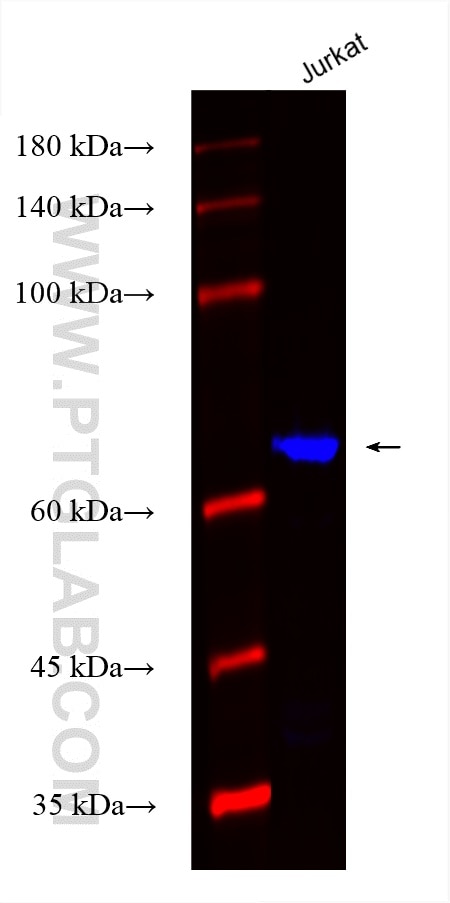Validation Data Gallery
Tested Applications
| Positive WB detected in | Jurkat cells |
Recommended dilution
| Application | Dilution |
|---|---|
| Western Blot (WB) | WB : 1:1000-1:4000 |
| It is recommended that this reagent should be titrated in each testing system to obtain optimal results. | |
| Sample-dependent, Check data in validation data gallery. | |
Product Information
CL750-82967 targets ACAP1 in WB applications and shows reactivity with human samples.
| Tested Reactivity | human |
| Host / Isotype | Rabbit / IgG |
| Class | Recombinant |
| Type | Antibody |
| Immunogen | ACAP1 fusion protein Ag34309 相同性解析による交差性が予測される生物種 |
| Full Name | ArfGAP with coiled-coil, ankyrin repeat and PH domains 1 |
| Calculated molecular weight | 740 aa, 82 kDa |
| Observed molecular weight | 82-85 kDa |
| GenBank accession number | BC018543 |
| Gene Symbol | ACAP1 |
| Gene ID (NCBI) | 9744 |
| RRID | AB_3673755 |
| Conjugate | CoraLite® Plus 750 Fluorescent Dye |
| Excitation/Emission maxima wavelengths | 755 nm / 780 nm |
| Form | Liquid |
| Purification Method | Protein A purification |
| UNIPROT ID | Q15027 |
| Storage Buffer | PBS with 50% glycerol, 0.05% Proclin300, 0.5% BSA{{ptg:BufferTemp}}7.3 |
| Storage Conditions | Store at -20°C. Avoid exposure to light. Stable for one year after shipment. Aliquoting is unnecessary for -20oC storage. |
Background Information
ACAP1, also named as Centaurin-beta-1, is a 740 amino acid protein, which is expressed Highly in lung and spleen. ACAP1 as a GTPase-activating protein (GAP) for ADP ribosylation factor 6 (ARF6) is required for clathrin-dependent export of proteins from recycling endosomes to trans-Golgi network and cell surface and required for regulated export of ITGB1 from recycling endosomes to the cell surface and ITGB1-dependent cell migration.
Protocols
| Product Specific Protocols | |
|---|---|
| WB protocol for CL Plus 750 ACAP1 antibody CL750-82967 | Download protocol |
| Standard Protocols | |
|---|---|
| Click here to view our Standard Protocols |
